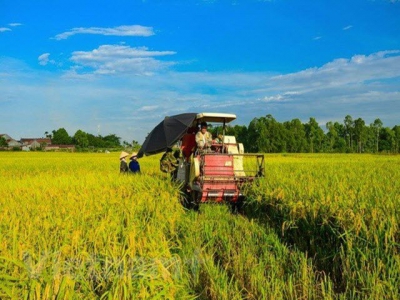PM approves plan to stock up on rice

Local farmers harvest rice in the Mekong Delta in the file photo. Prime Minister Nguyen Xuan Phuc recently approved a proposal to purchase 80,000 tons of unhusked rice and 200,000 tons of rice from farmers for storage to cope with the region's sharp drop in rice price - PHOTO: VNA
Ho Chi Minh City – Prime Minister Nguyen Xuan Phuc has approved a proposal to purchase 80,000 tons of unhusked rice and 200,000 tons of rice from farmers for storage to cope with the sharp drop in the price of rice in the Mekong Delta region, the local media reported.
A meeting was held today to find solutions to the price fall, and attended by the Ministry of Agriculture and Rural Development, the Ministry of Industry and Trade, the State Bank of Vietnam (SBV), the Vietnam Food Association and the Committee for Management of State Capital at Enterprises (CMSC).
The Ministry of Agriculture and Rural Development suggested the Ministry of Finance purchase the given volume of rice and unhusked rice. Also, both ministries will jointly buy an additional 100,000 tons of rice in line with a Governmental decree on policies to protect and develop forests and policies on poverty reduction and supporting minority populations in the 2015-2020 period.
The prime minister urged the two ministries to quickly buy the given volume of rice from farmers.
Apart from that, food corporations have to stock up on rice under the prevailing regulations and must soon plan to export 200,000 tons of rice to the Philippines. Also, Chinese buyers have decided to buy 100,000 tons of rice from Vietnam at this time.
Meanwhile, SBV has to consider giving commercial banks higher lending caps, allowing rice trading firms to have enough capital to buy rice, while CMSC and food corporations Vinafood 1 and Vinafood 2 have to map out specific plans to quickly buy rice from local farmers.
The ministries of Agriculture-Rural Development and Industry-Trade were asked to seek new markets for local rice in the long run, aside from traditional markets.
The agricultural ministry and localities have to effectively carry out a scheme for restructuring the rice sector, so that Vietnam can have more types of high-quality, branded rice, the prime minister noted.
Rice prices in the region have recently edged down VND500-VND1,000 per kilogram to VND4,000-VND5,000. Meanwhile, the winter-spring crop is the most important one of the year as it can generate high yields with high quality. Local rice farmers had high hopes of strong profits after the Tet holiday, but the current price fall has delivered a blow to them.
Moreover, rice consumption in the region is currently low due to the reportedly low number of orders from foreign rice buyers.
In Can Tho City, local farmers have had difficulty selling their rice as traders have offered much lower prices than in the pre-Tet period.
The farmers in the Mekong Delta city have harvested rice from over 1,100 hectares out of a total of more than 81,200 hectares for the 2018-2019 winter-spring crop, which has yielded about seven tons of rice per hectare. The total yield this year is expected to reach 570,000 tons of rice, and the harvest season lasts until the end of this month, according to the municipal Department of Agriculture and Rural Development.
Rice prices became volatile in the 10 days before and after Tet when the Mekong Delta provinces entered the harvest season for the 2018-2019 winter-spring rice crop, according to some rice traders. Meanwhile, rice businesses delayed resuming operations after the holiday, and some plants’ warehouses were only available for storing rice from February 13 (the ninth day of the lunar year).
Some rice types, including IR50404 and Jasmine 85, which were earlier forecast to enjoy strong demand this year, have seen their prices drop by an average of VND100-VND200 per kilogram compared with the levels on February 10.
Accordingly, rice traders who made deposits before Tet to buy fresh unhusked rice have grown concerned.
According to the Department of Industry and Trade in Can Tho, commercial banks usually set loan caps for rice enterprises based on their signed export contracts. However, major rice firms have yet to sign export contracts, affecting bank loan disbursements, lending caps and the rice price.
As for An Giang Province, both popular rice and high-quality rice prices have taken a nosedive. For instance, each kilogram of high-quality unhusked rice RVT is being traded at VND5,500, instead of VND8,000, as seen last year. Other high-quality unhusked rice types have encountered the same price decline.
The picture of rice exports in Dong Thap Province in the year to date has been gloomy as well, as the province’s rice inventories are worryingly high, at an estimated 120,000 tons, and the number of rice export contracts remains low.
To help facilitate rice trading activities and cope with the rice price fall, SBV on February 18 asked its provincial branches and commercial banks in the Mekong Delta region to balance their sources of capital to offer loans to enterprises that purchase rice, consider increasing loans and boost loan disbursements.
Related news
Tools

Phối trộn thức ăn chăn nuôi

Pha dung dịch thủy canh

Định mức cho tôm ăn

Phối trộn phân bón NPK

Xác định tỷ lệ tôm sống

Chuyển đổi đơn vị phân bón

Xác định công suất sục khí

Chuyển đổi đơn vị tôm

Tính diện tích nhà kính

Tính thể tích ao



 Livestock attempts to overcome 'CPTPP' wave
Livestock attempts to overcome 'CPTPP' wave  Close linkages yield profits for agricultural sector
Close linkages yield profits for agricultural sector